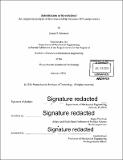| dc.contributor.advisor | Roger Petersen. | en_US |
| dc.contributor.author | Schuman, Joseph P | en_US |
| dc.contributor.other | Massachusetts Institute of Technology. Department of Mechanical Engineering. | en_US |
| dc.date.accessioned | 2016-12-05T19:57:28Z | |
| dc.date.available | 2016-12-05T19:57:28Z | |
| dc.date.copyright | 2016 | en_US |
| dc.date.issued | 2016 | en_US |
| dc.identifier.uri | http://hdl.handle.net/1721.1/105673 | |
| dc.description | Thesis: S.B., Massachusetts Institute of Technology, Department of Mechanical Engineering, 2016. | en_US |
| dc.description | Cataloged from PDF version of thesis. | en_US |
| dc.description | Includes bibliographical references (page 26). | en_US |
| dc.description.abstract | Have cell phones and the Internet created a revolution in the way that protests are organized? Or are they merely a substitution for previous methods of communication? The literature on the topic is divided between the cyberphiles, who argue that information and communication technologies (ICTs) allow individuals to better organize and amplify social movements and the cyberskeptics, who reject the idea that ICT represents a different mechanism of communication and instead argue that protests stem from underlying structural issues. I analyze protests from the Arab Spring and the dissolution of the Soviet Union in order to answer the question of substitution versus revolution. Through my empirical analysis, I find that cell phone subscriptions correlate positively with protest size, meaning countries with more cell phone subscriptions experienced larger protests, ceteris paribus. I did not, however, find the same result with Internet usage. My findings support the "amplification model" - that ICT amplifies existing social movements - but with some added nuance. I argue that the Internet amplifies information about protests to the wrong individuals - namely Internet users abroad who cannot participate in protests - while cell phones are used for domestic communication and thus increase the size of protests. | en_US |
| dc.description.statementofresponsibility | by Joseph P. Schuman. | en_US |
| dc.format.extent | 35 pages | en_US |
| dc.language.iso | eng | en_US |
| dc.publisher | Massachusetts Institute of Technology | en_US |
| dc.rights | M.I.T. theses are protected by copyright. They may be viewed from this source for any purpose, but reproduction or distribution in any format is prohibited without written permission. See provided URL for inquiries about permission. | en_US |
| dc.rights.uri | http://dspace.mit.edu/handle/1721.1/7582 | en_US |
| dc.subject | Mechanical Engineering. | en_US |
| dc.title | Substitution or revolution? : an empirical analysis of the relationship between ICT and protests | en_US |
| dc.title.alternative | Empirical analysis of the relationship between information and communication technology and protests | en_US |
| dc.type | Thesis | en_US |
| dc.description.degree | S.B. | en_US |
| dc.contributor.department | Massachusetts Institute of Technology. Department of Mechanical Engineering | |
| dc.identifier.oclc | 964448878 | en_US |
